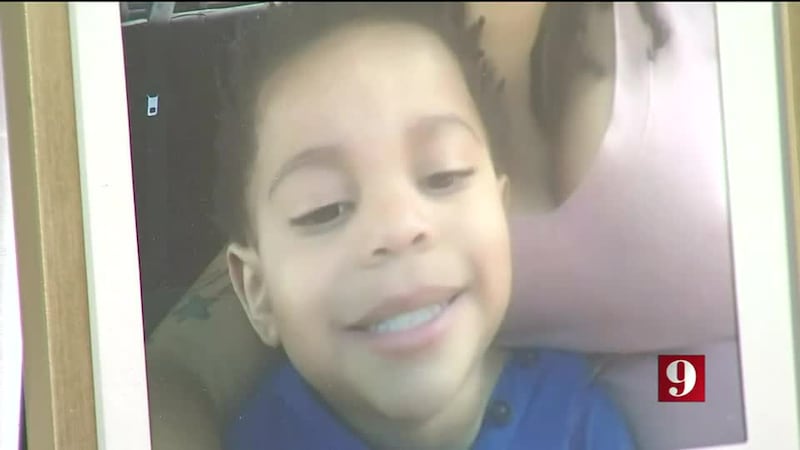ORLANDO, Fla. — Nayim Carter’s mother describes a happy and energetic toddler who loved “SpongeBob SquarePants” and “PJ Masks.”
She said the toddler loved to dance and dole out hugs and kisses.
“He had his whole life ahead of him,” his mother, Amina Muhammad, said.
READ: Viral video from toddler’s hospital room spurs debate over meaning of ‘brain dead’
On June 14, she and other family members initiated a Facebook Live that went viral, from Nayim’s hospital room at Nemours Children’s Hospital in Orlando. In the video, Nayim’s mom and dad took turns performing chest compressions on him as he lay in the hospital bed. In between chest compressions, they also showed viewers the monitor displaying Nayim’s vital signs.
He had been on a ventilator for more than a year, but doctors at Nemours Children’s Hospital in Orlando told the family the toddler’s heart stopped and there was nothing more they could do. They’d given the family time to say their final goodbyes, but the family was determined to keep Nayim’s life going.
READ: Child Tax Credit: Could you end up having to repay some of it?
Nayim had been taken to the hospital in December 2020 to be treated for pneumonia. But his health battle started in February of the same year when he nearly drowned in a swimming pool, according to investigators.
The family told 9 Investigates that they are not allowed, legally, to talk about the details of the accident, but we obtained interviews Polk County deputies conducted with Muhammad after the accident to rule out foul play, which they did.
Muhammad was questioned about how the toddler ended up in the pool and who was home at the time.
READ: Florida woman surprised to find $1 billion in bank account
“The lock is big enough to, for any person or … to make a mistake and forget to lock the pool door,” she told the investigator.
The sheriff’s office case was closed in April 2020, and the near drowning was ruled accidental. But the department’s investigative report provides insight into the battle over Nayim’s life that was playing out at Advent Health in Orlando, where he was transferred two days after the accident because of his severe injuries.
According to the investigators, two months after the accident doctors described Nayim as “still non-responsive” and “completely dependent on a ventilator.”
READ: ‘Non-fertilized human waste’ spills across busy Orlando road
The investigative report shows that Nayim’s CT scans showed an anoxic injury to the brain, and after one EEG doctors found “very minimal brain activity,” but not enough to sustain life in the opinion of doctors. His mother believes that brain activity was a sign Nayim was fighting for his life.
“He, Nayim, was very determined from the time he was in my stomach,” his mom said. She told doctors and investigators that the family believed that God would completely heal her son.
READ: ‘Like COVID-19 on steroids’: Delta variant found in 47 states including Florida
In an email, an Advent Health spokesperson did not respond to any of our specific questions and would only say, “The loss of a child is one of the most difficult things anyone will have to deal with, and our hearts go out to the family.”
The details surrounding Nayim’s death have raised questions about what it means to be brain-dead. It’s been so controversial recently that there is work happening to determine whether the definition should be revised. The question debated is whether hospitals and doctors should be allowed to declare a patient brain-dead without considering spiritual beliefs or even other medical research that questions what it means to be alive.
READ: Walgreens offering $25 incentive to new COVID-19 vaccine recipients
Cases like this have made headlines across the country and sparked controversy, court fights and questions about the Uniform Determination of Death Act.
“There have been a number of legal challenges and they continue,” said Dr. Robert Truog, the director of bioethics at Harvard Medical and also a professor of medical ethics, anesthesiology and pediatrics.
“There is discussion about whether the Uniform Determination of Death Act needs to be revised to address some of these concerns. One (question) is whether patients actually can be considered to be dead based upon the loss of brain function,” Truog said. “When other functions may continue. I should be clear that patients who are brain dead have a devastating degree of brain injury, and there’s never been anyone who has been diagnosed as brain dead, who has ever had any recovery of consciousness, despite reports that have appeared in the media.”
READ: ‘Waiting it out’: Cruise-reliant businesses in Florida remain on pause
The UDDA came after a Harvard Medical School report in 1968, which was reviewed in 2018 by Truog and three of his colleagues at Harvard. The report provided an alternative way to define brain death based on a series of tests, because of the invention of the ventilator, which is what doctors believe kept Nayim alive for more than a year.
Every state created statutes modeled after the act, which allows doctors to declare brain death if there’s irreversible circulatory, respiratory or brain function cessation, including of the brain stem.
READ: ‘We are really thrilled’: COVID-19 hospitalizations in Florida lowest in more than a year
In Florida, two physicians must provide independent diagnoses, and patients or their next of kin have to consent to brain death tests. Some hospitals rely heavily on what’s known as an APNEA test, which doctors believe provides the most definitive sign of loss of brain activity.
One physician must be the treating physician, the other can only be a board-eligible or board-certified neurologist, neurosurgeon, internist, pediatrician, surgeon or anesthesiologist.
READ: World’s most premature baby celebrates 1st birthday after beating 0% survival odds
And the statute states, “No recovery (financial) shall be allowed, nor shall criminal proceedings be instituted in any court against the physician or medical facility that makes a determination of death.” New Jersey has a religious exemption and Maryland considers the family’s desires.
Attorney Kevin Acevedo has represented families.
“The question is can a person, on the basis of their practicing a religion, (decide) that a person should not be declared brain dead because they’re entitled to believe that the person can only die and God can only take life when a heart stops, or lungs,” Acevedo said.






